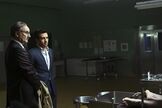Although the filming technique is not outstanding, it is indeed a thought-provoking film. 1 How the judge would have ruled if Colinney had not committed suicide. After all, according to the law at the time, he killed someone, a legally "innocent" person. Whether the injustice of the law itself can be a reason for exoneration, or the commutation of the sentence can only occur after the law is amended. In the judgment at that time, the reason for the crime could only be the difference between "a person stole an apple" and "a child who had been hungry for two days stole an apple", reflected in the severity of the sentence? The first injury Kliny suffered was from Hans Mayer, from Hitler, and the second injury he suffered was from the Dreyer Act, from the people who made and passed it. How should the injustice of the law be remedied? Can subjective will, even a general and collective one, be able to oppose existing laws in force? And how this unfair law came into being - 2 "Only murders carried out based on one's own judgment and motives" can be identified as murders. This general rule is applied to the special scene of war, and it becomes the "Dreyer Act", which becomes the reason for war criminals to escape their guilt. How should the duties and honors of soldiers be understood in wartime? How can individuals be held accountable for crimes committed by the state? The 1928 Paris Treaty of Non-War began to establish war crimes in international law. It was not until the end of World War II that the international community defined the actions of the Axis powers as "war crimes" and became "customary law". But who and how should state crimes be held criminally responsible? When the Nuremberg Trials and the Tokyo Trials pursue individual criminal responsibility for war crimes, what needs to be overcome is the problem of the individual's subject status in international law, as well as the basic principle of "law is not retroactive". Mayer's lawyers also defended him as "he was just a soldier in war who obeyed orders." The law is not well understood, but at ten for one, killing civilians, forcing children (no harm to women and children), Mayer, who made these decisions, is guilty no matter what. And this sinner--Three is a good man in everyone's eyes, including Colinny's defense attorney, Laney. For Laney, Mayer was like an adoptive father, and he was a stranger to his biological father. The cold-blooded executioner who murdered in the war was a model citizen of benevolence, kindness, generosity and generosity after the war. Among the arrested war criminals tracked by the Jews, such a situation is not rare. Is it the hypocrisy that deliberately hides the evil nature, or is it the psychology of atonement for the sins that one has committed? I am more convinced that the kindness shown by these people is not all fake, but also has a certain degree of self-consciousness. In the final analysis, it is still the old question: whether human nature is inherently good or human nature is inherently evil or both, it is human nature and human nature that determine human behavior Either the environment or both. The result of the confrontation between good and evil in each individual in a special environment, together, is the fate of the entire human race. PS. Learn a little bit of historical knowledge: Germany invaded Italy during World War II. After the US and British troops landed in Sicily in 1943, the Italian parliament voted for Mussolini to resign, arrested Mussolini, and formed a non-partisan government. After the fall of Mussolini, Hitler was worried about the surrender of Italy and the Allies and the Allied forces were concerned about landing in the south of Italy, sending German troops across the border to occupy the passes of the Alps, and caring about the establishment of the Pisa-Rimini defense line in the north of Italy to support the troops stationed on the Italian mainland south of the line of defense. The other 8 divisions of the German army. Special forces were also dispatched to rescue Mussolini and a puppet regime was established in northern Italy under German control.
View more about The Collini Case reviews











